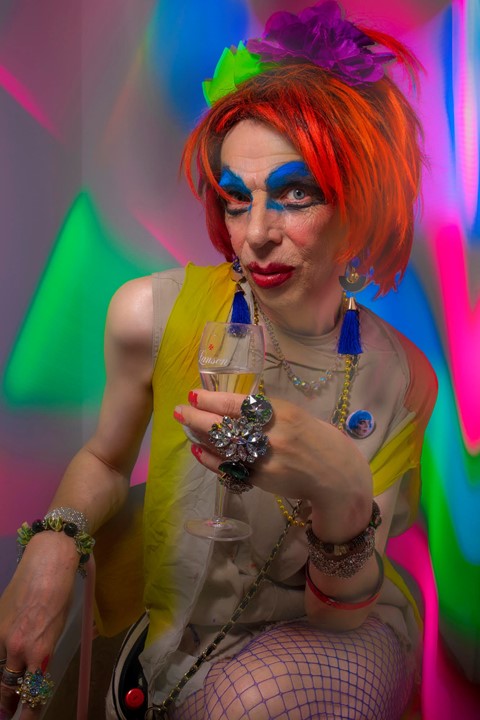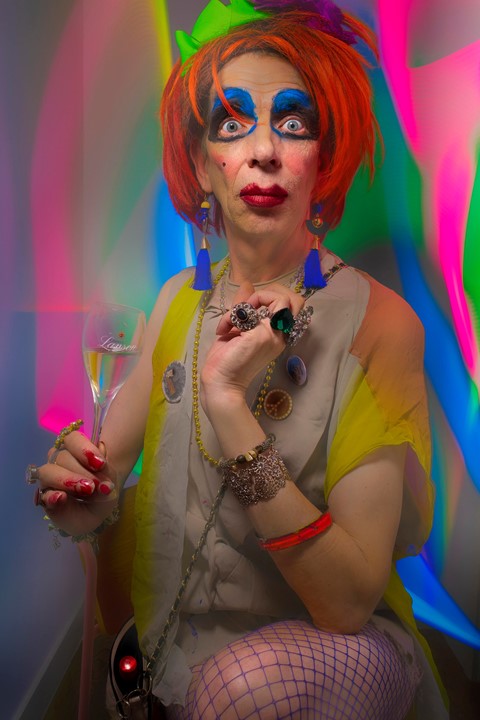Ahead of his latest show, David Hoyle: Rebellion, at London’s Royal Vauxhall Tavern, the queer scene legend speaks candidly about how the last 18 months have been for him, the current LGBTQ+ performance scene and RuPaul’s Drag Race UK
It's difficult to describe a David Hoyle performance if you haven't seen one, but certain words do at least convey some of the flavour: subversive, surprising, surreal and above all, searingly intelligent. Since he developed his zeitgeist-grabbing 90s persona The Divine David, an alter ago he killed off in a 2000 show titled The Divine David on Ice, he’s become a genuine queer scene legend. Award-winning performance artist Travis Alabanza hails Hoyle as an “icon, inspiration and pal”.
Following another soul-sucking lockdown, the Manchester-based provocateur is preparing to perform his latest show, David Hoyle: Rebellion, at London’s Royal Vauxhall Tavern. Though he made two The Divine David series for Channel 4 and later appeared in cult sitcom Nathan Barley, Hoyle’s ferocious social commentary is probably best experienced in the flesh. As he says during this warm and typically honest interview – Hoyle has always spoken candidly about his history of mental breakdowns, which he traces back to severe childhood trauma – he deals in “morning after shows”. In the moment, you’re rapt, but the next day you find yourself fully processing everything he said. It’s quite an experience.

Nick Levine: So, why is your new show called Rebellion?
David Hoyle: Well, I think we’re overdue a rebellion given everything we’ve been through collectively and individually since last March. We’re either complicit or we come out of this situation more defiant. You know when they go on about things going back to normal? Well, that’s the last thing I want.
NL: What do you want to happen instead?
DH: Obviously I’m very idealistic, like a lot of arty people are, and some people might accuse me of woolly thinking or whatever. But I don’t care: I pray for a fairer and more enlightened society. I think that we live in a fascist dystopia with a corrupt government and a complicit media, and it’s time to see if there’s an opportunity for cleansing.
NL: Does it frustrate you when people say, “But we can’t criticise the government too much at a time like this.” There’s almost an element of Stockholm syndrome to it.
DH: Yes. And I think they definitely are the worst government this country has ever seen. They’re corrupt, it’s a chumocracy, and they’re so hypocritical in telling people to do one thing while they do another. These people have no credibility as far as I’m concerned. And I think the press does allow them to get away with it. I mean, I’m old enough to remember people like Howard Wilson who would occasionally address the nation, and when he did it was real and it meant something. Whereas these people are just jokers and not worth any respect whatsoever. When you think that this premiership started with [Boris Johnson] lying to the head of state, well, it’s just downhill all the way from that.
“I think like a lot of people who have dedicated themselves to art, expression, performance, whatever, when you’re forced not to do it anymore, you realise just how much of your life it took ... it kind of forces you to look at your life – the price that you paid, basically” – David Hoyle
NL: How have the last 18 months been for you on a personal level? How challenging have you found it?
DH: Horrible. I think like a lot of people who have dedicated themselves to art, expression, performance, whatever, when you’re forced not to do it anymore, you realise just how much of your life it took. Because you might not have a lot of intimate relations and friendships, it kind of forces you to look at your life – the price that you paid, basically. When you live your life by doing a show, then maybe another show a week later, and so on, you’re keeping busy. That’s how I’ve been living for years – most of my life, really. So when it all comes to a crushing, crashing holt, you’re aware that there’s a lot of emptiness in your life. On a personal level, that’s what I’ve found and it has been very painful.
NL: What did you try to fill that emptiness with? Could you fill it with anything?
DH: Really by churning out pictures and doing as much art as possible – I was working on my collages just prior to you phoning, actually. A friend of mine in Manchester is very kindly going to open his flat up and exhibit my work alongside work by Lee Baxter. He’s a noted photographer here in Manchester who’s done a lot of graphic design work, and the two of us have been friends for over 30 years, so we’re now working on a joint exhibition.
NL: How does making art compare to live performance for you?
DH: Well, it’s better than staring into space. Everything I do, really, is a displacement activity or some form of catharsis. Because like a lot of people from my generation, I’m still dealing with post-traumatic stress disorder from my childhood. If you grew up being different in the 60s and 70s, as I did, you were completely persona non grata. I’m 15 months off being 60 and do you know what, the other night was the first time I’ve ever watched a football match from beginning to end. And it did feel like quite a historic moment for me.
NL: Did you enjoy it?
DH: Yes, I did. In the past I always felt excluded from that world, you know, because I was brought up to believe that I was completely beyond the pale and that polite society, anybody decent, wouldn’t want anything to do with me. That leads to real feelings of alienation and isolation. And unfortunately, I have internalised a lot of this negativity. It’s not water off a duck’s back, and I live with it every day of my life. And again, it’s very painful. It’s probably why I live on my own, you know, because it’s the only way I can get through the day, in a way. It’s quite sad, because I probably would – like anybody else – have wanted to settle down, get married, and have a bit of responsibility in my life. But I think that when you’ve been damaged by what’s gone on in the past, you are damaged, and you just have to face it.
NL: What do you see your purpose as?
DH: To prove that people like me, who were indoctrinated to believe that we must never say anything, that we should be ashamed of ourselves, and that if possible, we should kill ourselves, don’t do that. Quite the opposite: we should speak and we should express ourselves and we should not let our oppressors win.
NL: It must be incredibly gratifying, then, when someone like Travis Alabanza names you as a major inspiration.
DH: It’s amazing. That sort of thing really does keep you going, because obviously they’re a lot younger than me. I don’t want to end up as some sort of old person who’s lost touch with what’s going on. I find what performers like Travis are doing so fascinating – they’re doing very interesting and intelligent work.
“I’ve met a lot of wonderful people who are far younger than me [on the scene] who have all sorts of things to express ... you can’t tell them what to think and you can’t make them submit. They’re not going to be quite so obedient as perhaps people of my generation were, and I find that refreshing”
NL: What do you think of the current LGBTQ+ performance scene?
DH: I think it’s very exciting. I’ve met a lot of wonderful people who are far younger than me [on the scene] who have all sorts of things to express. It’s a very developing situation and I feel that with younger people, you can’t tell them what to think and you can’t make them submit. They’re not going to be quite so obedient as perhaps people of my generation were, and I find that refreshing. Because you know they’re not going to waste their time.
NL: Did you watch RuPaul’s Drag Race UK at all?
DH: I haven’t really, though I have dipped in once or twice. I mean, I like Joe Black and Baga Chipz – I bumped into them in Manchester and they were very sweet to me. But it’s hard graft, that show, and I believe it can be quite a costly affair with all the costumes and that. People can end up in debt.
NL: And in a way, that can create a bit of a barrier for new performers – it makes drag seem less accessible if you don’t have money.
DH: Definitely – and drag should be accessible. I think drag now is an umbrella term and it’s accessible to everybody irrespective of so-called gender. Look at pioneers like Holestar who are operating in the drag world now, and look at the drag kings. I had the pleasure of meeting Adam All a few months ago – great name, great performer – and it’s these people who are really helping to push things forward.
NL: Finally, what do you want people to think when they hear the name David Hoyle?
DH: Freedom.
David Hoyle: Rebellion is at London’s Royal Vauxhall Tavern on 1 July, then Manchester’s HOME on 23 July. Follow David Hoyle on Instagram here.
